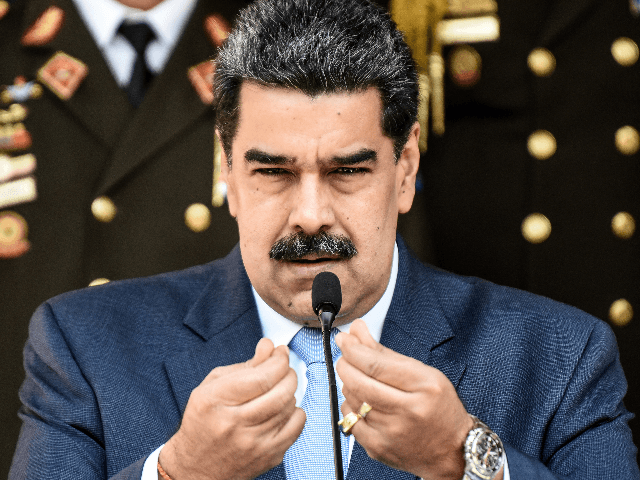Venezuelan socialist dictator Nicolás Maduro lost access to his Facebook page for a month, the BBC reported Sunday, for repeatedly promoting unproven Chinese coronavirus cures and violating the social media company’s posting standards.
Maduro has spent months promoting two uniquely Venezuelan coronavirus “cures”: the rectal administration of ozone, a potentially fatal toxic gas, to kill coronavirus cells; and Carvativir, or “miracle droplets” reportedly made of thyme and oregano. While Maduro has insisted that the two methods have saved untold lives under his regime, minimal scientific research exists into these methods and no evidence suggests they have any significant success against Chinese coronavirus. The American Food and Drug Administration (FDA) has explicitly warned that ozone therapy is more likely to kill a person before killing enough coronavirus cells in that person’s body to make a difference in curtailing infection.
While Facebook has limited Maduro’s reach, World Health Organization (W.H.O.) head Tedros Adhanom Ghebreyesus, who is not a medical doctor, entertained the regime’s false cures during a conversation with Maduro Vice President Delcy Rodríguez this weekend.
The United Nations, of which the W.H.O. is a subsidiary, considers Maduro the president of Venezuela despite his final term legally ending in January 2019. The true president of Venezuela is a lawmaker named Juan Guaidó, who has failed to use his constitutional powers as the nation’s armed forces remain illegally loyal to Maduro.
Facebook confirmed to the BBC in a report published Sunday that Maduro had lost access to the platform for at least 30 days due to posting false information about coronavirus treatments.
“We removed a video posted to President Nicolás Maduro’s page for violating our policies against misinformation about Covid-19 [Chinese coronavirus] that is likely to put people at risk for harm,” a spokesperson for the company said. “We follow guidance from the W.H.O. [World Health Organization] that says there is currently no medication to cure the virus. Due to repeated violations of our rules, we are also freezing the page for 30 days, during which it will be read-only.”
Spain’s El País reported that the offending content that triggered the temporary ban was a video published in January in which Maduro promoted Carvativir describing it as “miracle droplets” and claiming it could fully cure Chinese coronavirus infections. The report did not clarify why the temporary ban is occurring months after the publishing of content violating posting guidelines.
At the time, Facebook prevented Maduro from uploading Carvativir videos, prompting a televised rant by the dictator against Facebook owner Mark Zuckerberg.
“Who is in charge in Venezuela, the owner of Facebook? Who rules the world, the owner of Facebook? Zuckerberg is a tremendous abuser,” Maduro railed. “The world has to reflect on the abuses of social networks. They are multimillionaire people who try to impose their truths, their reasons, their abuses on the world.”
Maduro appeared to be able to access his account after this incident until this week.
Facebook limiting the Venezuelan socialist dictatorship’s access to its platform occurred nearly simultaneously with Tedros thanking Rodríguez, Maduro’s “vice president,” for what he called a “constructive call” on the pandemic. Tedros claimed on Twitter — an outlet that has not yet censored Maduro’s false coronavirus cure content — that the talk focused on using the United Nations Covax platform to ensure that Venezuelans receive doses of vaccines against the virus.
Rodríguez, on her Twitter account, claimed the conversation was about Carvativir.
“We also informed [Tedros] about the advances in our clinical trials of Carvativir and other anti-virals studied in our country,” Rodríguez wrote. “From Venezuela, we join this tough battle [against] the worst pandemic humanity has ever known! United as one world we will come out victorious.”
The conversation with Tedros appears to be part of a greater effort on Maduro’s part to acquire doses of coronavirus vaccines and vaccine candidates. On Sunday, Maduro suggested in a nationally televised broadcast that he could offer nations that have developed coronavirus vaccine candidates crude oil in exchange for doses.
“Venezuela has the oil ships, it has the clients, so that they buy our oil and would dedicate part of their production to guarantee all the vaccines Venezuela needs,” Maduro said, without specifying a country. “Oil for vaccines!”
Russia and China, two of Maduro’s few remaining allies on the globe, have produced local vaccine candidates against the virus currently in distribution at home. As both rogue states rely on many of the same alliances, they are competing for the attention of states that would not contract with more reliable pharmaceutical companies in countries like the United States or India.
Russian Deputy Prime Minister Yuri Borisov is traveling to Caracas as of Monday to meet with high-ranking Maduro officials, the Spanish news service EFE reported. EFE suggested Borisov’s first and most important meeting in the country would be with Tareck El Aissami, Venezuela’s oil minister and considered Maduro’s top liaison to the Iranian terrorist organization Hezbollah. The report did not clarify if Russia’s vaccine candidate, Sputnik V, would factor into any oil deals with Caracas.

COMMENTS
Please let us know if you're having issues with commenting.